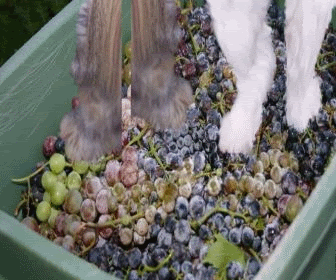I have been reading alot lately about people being worried about cleanliness with their winemaking equipment. I see it turning into a neurosis amongst home wine makers today. From my personal opinion and my personal experiences, this is very much over-played and over-hyped amongst ourselves. Let me explain my OPINION...
When you have fresh juice or must or even an unfermented kit, you have an environment that is an excellent place to harbor microorganisms that could be harmful to your wine. This is the most vulnerable stage in a wine's life as it has no inherent protection against bad bugs. This is why we sulfite our must and use strong yeast to ferment down. This is when the cleanliness counts. Use sanitizer solution and spray your utensils and tools down before you punch down your cap or take samples.
Along the same lines when a wine has fermented and created alcohol, it now has a level of inherent protection from microorganisms. Alcohol by itself cannot harbor most microorganisms. Granted at the levels we have it is not high enough to counter against every kind of bug. But after you ferment and secondary ferment (should you choose to), you should be adding sulfites to hedge your bets and add another layer of protection on your investment. Bulk aging and clearing is not nearly as prone to bacterial infection as it was before fermentation. Most of the time when I rack my wine I simply rinse out the carboy if it appears to be clean with hot water and let it dry. I haven't had one single problem with infection at all.
Even for bottling if I have new bottles I will only rinse them out for 5 seconds or so on the bottle washer with hot water. I have yet to have a bottle that was spoiled. My point is that people should not be losing sleep over sanitizing to a surgical level after fermentation. I can't say I recommend being a slob after fermentation and you may be the unlucky one that gets screwed but chances are you won't. I understand you spend alot of time and money on your wine endeavors as do I, and many of you will say you might as well have the best chance. This is absolutely true and you are right, but on the flip side it may not be as dangerous as it seems to not be surgical clean.
I guess my point is that wine making should be fun and easy going. You are making something that you are going to have fun with and the process itself is a blast! Relax, pour another glass of wine, eat something bad for you, and enjoy the process! Don't sweat the small stuff.
AGAIN THIS IS BASED ON MY PERSONAL EXPERIENCE AND IS MY OPINION!
When you have fresh juice or must or even an unfermented kit, you have an environment that is an excellent place to harbor microorganisms that could be harmful to your wine. This is the most vulnerable stage in a wine's life as it has no inherent protection against bad bugs. This is why we sulfite our must and use strong yeast to ferment down. This is when the cleanliness counts. Use sanitizer solution and spray your utensils and tools down before you punch down your cap or take samples.
Along the same lines when a wine has fermented and created alcohol, it now has a level of inherent protection from microorganisms. Alcohol by itself cannot harbor most microorganisms. Granted at the levels we have it is not high enough to counter against every kind of bug. But after you ferment and secondary ferment (should you choose to), you should be adding sulfites to hedge your bets and add another layer of protection on your investment. Bulk aging and clearing is not nearly as prone to bacterial infection as it was before fermentation. Most of the time when I rack my wine I simply rinse out the carboy if it appears to be clean with hot water and let it dry. I haven't had one single problem with infection at all.
Even for bottling if I have new bottles I will only rinse them out for 5 seconds or so on the bottle washer with hot water. I have yet to have a bottle that was spoiled. My point is that people should not be losing sleep over sanitizing to a surgical level after fermentation. I can't say I recommend being a slob after fermentation and you may be the unlucky one that gets screwed but chances are you won't. I understand you spend alot of time and money on your wine endeavors as do I, and many of you will say you might as well have the best chance. This is absolutely true and you are right, but on the flip side it may not be as dangerous as it seems to not be surgical clean.
I guess my point is that wine making should be fun and easy going. You are making something that you are going to have fun with and the process itself is a blast! Relax, pour another glass of wine, eat something bad for you, and enjoy the process! Don't sweat the small stuff.
AGAIN THIS IS BASED ON MY PERSONAL EXPERIENCE AND IS MY OPINION!














![[Upgraded] 9Pcs Tree Root Growing Box with Drain Holes, Half Transparent Plant Rooting Propagation Ball & Metal Core Twist Ties, for Fast Propagation Plants (Size M)](https://m.media-amazon.com/images/I/514MWQxtWOL._SL500_.jpg)










































